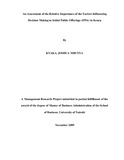| dc.description.abstract | The present study set out to assess the relative importance of the factors internal to a firm that
motivate companies to conduct IPOs at a particular given time, at a certain offer price with the
help of a specific underwriter and investment banks . The study was designed to understand the
dynamics of the IPO process in companies going public in Kenya. Past research trends have
had an excessive dependency on publicly available stock market data contained in the filings
and publications of stock exchange authorities. This research paper sought to investigate from
an empirical perspective the fundamental questions in IPOs and the specific factors which
managers consider as important in the process of an Initial Public Offering in corporate Kenya.
The study revealed that, among the factors motivating firms to issue an IPO was the desire to
broaden their ownership base and the need to minimize their cost of capital. The decision as to
when to roll out the IPO is most influenced by the firm’s timing for implementing its
investment expansion programmes and overall market conditions. The industrial expertise of
the underwriter bank and their quality of the trading desk services and liquidity services are the
two most important factors influencing the choice of the underwriting bank among Kenyan
firms. The desire to reduce IPO marketing costs and the intention of creating a cascade effect
so as to make the IPO attractive and thus successful were found to be the most important
factors influencing the levels of under-pricing witnessed in Kenyan IPOs. The two most
important positive signals that IPO firms would want to send are strong historical earnings and
their ability to use one of the big four accounting firms. The most negative signal they do not
want to send to the public is the sell of insider shares to external investors during the IPO.
Finally in terms of process issues, IPO firms are more concerned with a firm commitment
arrangement and a long lock up period by original owners as means of making the IPO
attractive to investors and thus guaranteeing its success. | en_US |

